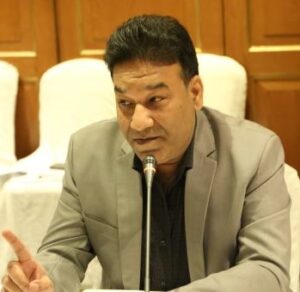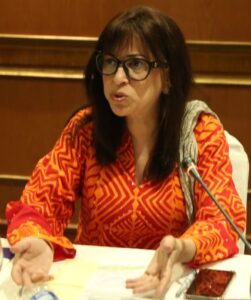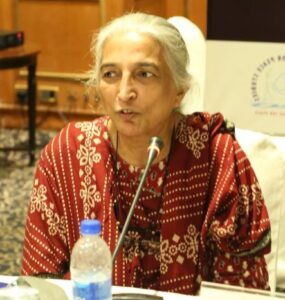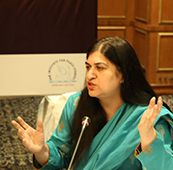PIPS Consultation on “Promoting Narratives of Diversity, Inclusion, and Peace among Youth”
Lawmakers, academics, religious scholars, journalists, lawyers, government officials and representatives of youth and civil society participated in the event.
Session I: “Promoting Diversity, and Inclusion through Education”
Project Manager PIPS Ahmed Ali moderated the session. Opening the discussion, he said that findings of the institute’s all provincial and national research reports on “perspectives and worldview of Pakistani youth and interfaith relations” reveal that there is an identity crisis and lack self-confidence among the educated youth. The research shows that students of higher education have certain biases towards different sects, faiths and ethnicities. There is confusion among them about the constitution and democratic values. He underlined that the purpose of the session was to get views from experts about the loopholes present in the education system that inculcates such confused views among the youth.
 Executive Director of Centre for Social Justice in Lahore Peter Jacob informed the discussants that some civil society organizations had moved a petition in the Supreme Court stating there was hate material in the curricula and only one religion – Islam – is taught in schools. He said that the petition also noted that 40 per cent material belonged to faith in some subjects despite that these don’t have direct link with the religion.
Executive Director of Centre for Social Justice in Lahore Peter Jacob informed the discussants that some civil society organizations had moved a petition in the Supreme Court stating there was hate material in the curricula and only one religion – Islam – is taught in schools. He said that the petition also noted that 40 per cent material belonged to faith in some subjects despite that these don’t have direct link with the religion.
Mr Jacob said that the apex court took up the case that resulted in removal of hate material from the curriculum to much extent and a policy step was taken that subjects of seven religions should be introduced in the curriculum for the students belonging to religions other than Islam. He said that books of seven religions couldn’t be prepared during the current academic year but a formal approval has been given and the same were under publication process.
While endorsing the point of view of the moderator, Mr Jacob said that many experts have reservations that the Single National Curriculum might increase Islamization in the society. “The issues of general representation, glorification and stereotyping about certain ethnicities are there in the curriculum.” He said that concepts of life in the books encouraged violent tendencies and did not fulfill educational needs. He also held that methods of teaching in the present education system were flawed.
 Religious scholar and educator Ziaul Haq Naqshbandai admitted that an unnecessarily excessive religious material was present in the educational curriculum, which was devoid of basic necessities of the students. He pointed out that even students have to appear in compulsory Islamiyat (Islamic studies) paper in competitive examinations for civil services. He urged the need to promote “mysticism” in the curriculum. He argued that the state uses the religious divisions within the society for its own interests. He added that its policies were resulting in making more divisions even within different sects of Islam and referred to the establishment of new “wafaqs” or educational boards for seminaries.
Religious scholar and educator Ziaul Haq Naqshbandai admitted that an unnecessarily excessive religious material was present in the educational curriculum, which was devoid of basic necessities of the students. He pointed out that even students have to appear in compulsory Islamiyat (Islamic studies) paper in competitive examinations for civil services. He urged the need to promote “mysticism” in the curriculum. He argued that the state uses the religious divisions within the society for its own interests. He added that its policies were resulting in making more divisions even within different sects of Islam and referred to the establishment of new “wafaqs” or educational boards for seminaries.
 Danish Tariq of the Youth Advocacy Network, Lahore, said that education was being forcefully injected into students. He said that the curriculum was more focused on religious studies rather than giving life skills to the youth. People are fearful to talk about religion, which restricts the students to question and criticize. He also underscored that there was an abundance of hate speech on social media and no steps had been taken to check this flow of information.
Danish Tariq of the Youth Advocacy Network, Lahore, said that education was being forcefully injected into students. He said that the curriculum was more focused on religious studies rather than giving life skills to the youth. People are fearful to talk about religion, which restricts the students to question and criticize. He also underscored that there was an abundance of hate speech on social media and no steps had been taken to check this flow of information.
 Writer and columnist Gul Nokhaiz Akhtar was of the view that media cannot be absolved of the charge of promoting extremism. He said that media owners didn’t allow their platforms to be used for discussions related to religion as they felt threatened to talk about it. He further said that religious intolerance has increased in the society. “There is less space for religions (other than Islam) in the society and education sector,” he said and added, “We need to bring secularism in our behaviors.”
Writer and columnist Gul Nokhaiz Akhtar was of the view that media cannot be absolved of the charge of promoting extremism. He said that media owners didn’t allow their platforms to be used for discussions related to religion as they felt threatened to talk about it. He further said that religious intolerance has increased in the society. “There is less space for religions (other than Islam) in the society and education sector,” he said and added, “We need to bring secularism in our behaviors.”
 Sajeela Naveed, Director General Press Information Department (PID), Lahore argued that values start from family and unfortunately the family system has been crushed. “We are judgmental towards other people.” She urged the need to introduce subjects of character building in the curriculum and hold interactive sessions. She called for making vocational training mandatory. She said that discussions and debates should be encouraged among youth.
Sajeela Naveed, Director General Press Information Department (PID), Lahore argued that values start from family and unfortunately the family system has been crushed. “We are judgmental towards other people.” She urged the need to introduce subjects of character building in the curriculum and hold interactive sessions. She called for making vocational training mandatory. She said that discussions and debates should be encouraged among youth.
 Saeeda Diep, Director of the Center for Peace and Secular Studies, Lahore concluding the first session said that there was class difference in the society, and expensive private schools create and promote elitism among students. She called for changing and rewriting the syllabus to “change the fate of the nation.” She said that the basis of all walks of life was the present educational system, which was the major root cause of the prevalent problems. “Youth are more vulnerable to political polarization,” she said, adding that there was a need to reconstruct the whole system.
Saeeda Diep, Director of the Center for Peace and Secular Studies, Lahore concluding the first session said that there was class difference in the society, and expensive private schools create and promote elitism among students. She called for changing and rewriting the syllabus to “change the fate of the nation.” She said that the basis of all walks of life was the present educational system, which was the major root cause of the prevalent problems. “Youth are more vulnerable to political polarization,” she said, adding that there was a need to reconstruct the whole system.
Session II: Critical Role of Policymakers, and Legislators in Youth Development
While moderating the session, Joint Director PIPS Safdar Sial in his introductory remarks said that the purpose of discussion was to finalize some policy recommendations for promoting social cohesion, and religious harmony among youth. “We understand that youth empowerment and development is a broader context through which we can address the issues of interfaith relations.” He said that discussion could be seen in the context of social contract between the state and societal groups, especially the societal group of youth. He further said that this has to be seen how youth participation could be enhanced in decision making processes.
 Member of Punjab Assembly Ms. Kanwal Pervaiz Ch, who was the chief guest of the session, said that further faith-based divisions into society were affecting the youth. She said that youth should be the focus of the national policies, but the reality was contrary to it. She viewed that the laws on youth development were there. “Even the issue is over-legislation [where existing laws] required proper implementation. She added that political empowerment and career counseling of the youth should be a mandatory job for the state.
Member of Punjab Assembly Ms. Kanwal Pervaiz Ch, who was the chief guest of the session, said that further faith-based divisions into society were affecting the youth. She said that youth should be the focus of the national policies, but the reality was contrary to it. She viewed that the laws on youth development were there. “Even the issue is over-legislation [where existing laws] required proper implementation. She added that political empowerment and career counseling of the youth should be a mandatory job for the state.
 Dr Rahla Rahat of the Institute of Social and Cultural Studies in Punjab University remarked that religious harmony and social cohesion were two buzzwords. “We need to define what do we mean by cohesion?” she said, adding that a clarity in goals was necessary before finalizing recommendations on the issue. “Cohesion is a very vague term.” She said that those at the helm of state affairs should see what they are giving to youth. She claimed that there was diversity present among youth due to many factors and bases. She recommended that academia’s research on youth development should be channelized. “Critical thinking is missing in the education system as questioning is discouraged,” she also noted.
Dr Rahla Rahat of the Institute of Social and Cultural Studies in Punjab University remarked that religious harmony and social cohesion were two buzzwords. “We need to define what do we mean by cohesion?” she said, adding that a clarity in goals was necessary before finalizing recommendations on the issue. “Cohesion is a very vague term.” She said that those at the helm of state affairs should see what they are giving to youth. She claimed that there was diversity present among youth due to many factors and bases. She recommended that academia’s research on youth development should be channelized. “Critical thinking is missing in the education system as questioning is discouraged,” she also noted.
Muhammad Abdullah, a consultant on technical and professional education, stressed the need to promote technical education at high school and college levels by making it mandatory for getting secondary school, and higher secondary school certificates and bachelor degrees. He said that small courses, certifications and training must be made a legal requirement to get jobs. “We need people of multiple skills.” He said that there should be proper legislation in the education sector before making any educational policies and the same should be implemented and pursued in letter and spirit.
Fatima Razzaq, a researcher and journalist associated with Lok Sujag, talked about how platforms for political participation of youth could be strengthened and said that the youth have become apolitical due to the ban on student unions. “Political participation is not possible without revival of student unions.” She also pointed out that the dropout rate was very high among students of minorities in higher education classes and emphasized that the issue needed to be addressed.
 Educationist Dr Amjad Tufail said that the primary focus should be placed on teacher training. He deplored that a teacher joins his profession with “lower level of intellect, motivation and economic benefits and higher level of frustration” and gives a reflection of all this in the classroom. He also said that unguided and unemployed youth could be damaging for the country and the state should seriously see whether it could bear their burden.
Educationist Dr Amjad Tufail said that the primary focus should be placed on teacher training. He deplored that a teacher joins his profession with “lower level of intellect, motivation and economic benefits and higher level of frustration” and gives a reflection of all this in the classroom. He also said that unguided and unemployed youth could be damaging for the country and the state should seriously see whether it could bear their burden.
Sial concluded that there was a perceived sense of the discrimination among youths due to their ethnic, regional, cultural and geographical issues, and cohesion couldn’t be achieved without addressing such inequalities.


